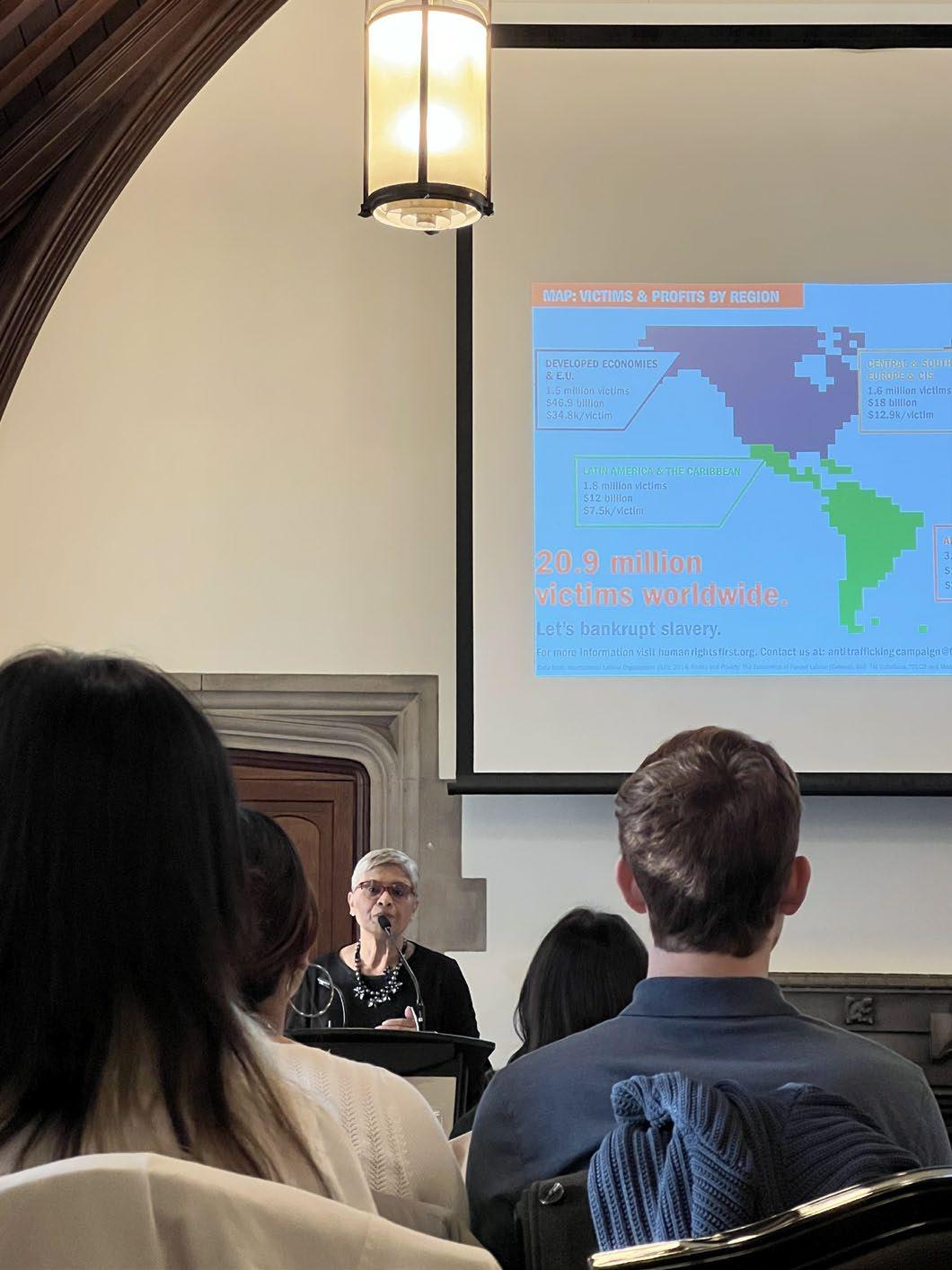
Volume 16; Issue 2; May 2024






Volume 16; Issue 2; May 2024





With a steadfast commitment to families, Family Services of Peel is embarking on a new strategic and action plan. This plan is not just a document but a collective effort to champion families in the broader sense. We understand that families are diverse and dynamic, and the concept of family continues to evolve to reflect changes in society, culture, and individual preferences.
In the broader sense, family refers to a group of people who are connected by blood, marriage, adoption, or other forms of kinship and who typically share a common living space and resources. From a functional perspective, we know that the family is a social institution that provides emotional support, nurturance, socialization, and practical assistance to its members, contributing to their well-being and development.
As a Family Service Agency, we would like to increase our family programming through the following:
1. Provide and support initiatives for Education and Skill Development that provide parents with education, training, and skill development opportunities to enhance their economic stability and career prospects, ultimately benefiting their families.
2. To increase and promote access to Family Counseling and Support Services for individual couples and families facing challenges such as marital conflict, parenting stress, substance abuse, or domestic violence.
3. Promote community-based initiatives that provide Support and Resources for families, such as community centers, family resource centers, food assistance programs, and mentoring programs for at-risk families.
4. Support initiatives that promote Family Values and Relationships. These initiatives should promote positive family values, healthy relationships, communication skills, and conflict resolution strategies to strengthen family bonds and resilience.
5. Advocate for policies and initiatives that recognize and respect diverse family structures, including non-traditional families, blended families, LGBTQ+ families, and chosen families.
6. Collaborate with other organizations, advocacy groups, policymakers, and community stakeholders to advocate for family-friendly policies and address systemic barriers that affect families' well-being.
7. Support research initiatives and data collection efforts to better understand the needs, challenges, and strengths of families in different communities, informing evidence-based policy and program development.
We know that working for change can be a long and challenging process, but seeing progress towards a better community is also incredibly rewarding Identifying the issue we care about families will involve research, networking with like-minded individuals and organizations, and actively engaging with others.
Hope you partner with us on this initiative and have a great summer!



Family Services of Peel will hold its 53rd Annual General Meeting on Wednesday June 19, 2024 at 9:00am. Reserve your spot!

Family Services of Peel, in collaboration with Elder Abuse Prevention Ontario (EAPO) and Peel Elder Abuse Prevention Network (PEAPN), invites the community to an event titled "Perspectives on Recognizing and Speaking about Elder Abuse and Neglect." This will take place on June 13, 2024, from 9:30AM to 12:30PM at the Mississauga Grand Banquet & Event Centre.
The session aims to foster dialogue on elder abuse and caregiving challenges, with guest speakers Mary Shkoury and Raeann Rideout addressing the complexities of elder abuse and neglect. Participants will share their viewpoints and experiences. For registration and further information, contact Sylvia Knight-Yard at peapn@fspeel.org.

As we approach the summer, FSP is getting ready to welcome our summer students and youth as part of the ESDC Canada Summer Jobs Program.
This program provides valuable work experience and skill development opportunities for young individuals. We are excited to integrate their fresh perspectives and energy into our ongoing projects and initiatives, contributing to the growth and success of our community programs.

Our Family Education Programs help foster stronger bonds and deeper engagements. Through interactive games and creative activities, families discover the joy of learning together! Email relali@fspeel.org for more information.








Family Services of Peel (FSP) is developing a strategic plan to guide the organization over the next 5 years. The Peel Institute of Research and Training (PIRT) has conducted an Environmental Scan that will support FSP in this endeavour The Environmental Scan will help us understand trends and seize opportunities that will help our communities thrive in changing times. It will help our work remain relevant, alongside major global influences. Our work will be on track to be optimally purposeful for the diverse population and communities of Peel Region.
The environmental scan’s insights that will shape FSP’s future, comprise 4 main pillars of action, best described as follows: 1) Family Unit, 2) Community, 3) Research and Training, 4) Equity, Oppression and Anti-Racism advocacy and action.
PIRT has completed a preliminary literature review, entitled Sickle Cell Disease and Developmental Disability Inequities of Care, in partnership with the Red Blood Cell Disorders Clinic at the University Health Network (UHN).
Knowledge transfer is a key aspect of the research projects undertaken by PIRT. An article called “The Impact of Racial Microaggressions on Black Youth in the Region of Peel” has been accepted for publication by Nova Science Publishers, one of the leading Scientific, Technical and Medical publishers worldwide.
A presentation was delivered at the Guyana Mental Health and Well-being Conference, entitled “Building Trauma Specific Services and Programs for Children Survivors of Abuse and Perpetrators of Violence”.


Currently, FSP’s main support efforts are in the following areas: Mental Wellness, Victims of Family Violence, Survivors of Human Sex Trafficking, Seniors, People Living with Disabilities, and Employment Services Programs. Opportunities for new initiatives exist in tailored support for 2SLGBTQIA+ and for newcomers settling in our region.
PIRT has become an external evaluator of several important projects. Among them are the following: 1) Justice and Freedom Program – Indus Community Services, AntiHuman Trafficking Project, 2) Peel’s 2020-2024 Community Safety and Well-Being (CSWB) Plan - Newcomer Youth/Young Adults’ Mental Wellness (United Way seed funding project), and 3) Peel’s 2020-2024 CSWB PlanDevelopment of a culturally responsive framework and toolkit for Family Violence Services.
A presentation has been accepted by the Canada Coalition of Women in Engineering, Science, Trades and Technology (CCWESTT) Conference in Vancouver titled “Socialization and Gender Equity in the Family: How Do Families Produce an Environment that Facilitates Women’s Entry into STEM?”
PIRT will be engaged in an Action Plan which will connect directly with FSP’s new strategic plan. It will be updated yearly to reflect the ever-evolving nature of community needs for research and training. Developing strategic actions around research, training, and knowledge mobilization can lead to improvements in service outcomes, performance, and expanded knowledge sharing. It is in this way that we can continue to strengthen the quality and effectiveness of our community-based research work and push the strategic directions of FSP forward over the coming 5 years.

The Intake Department at Family Services of Peel serves as the initial point of contact for new clients seeking various counselling services. It efficiently manages new enrollments, walk-ins, and employee assistance program (EAP) referrals, ensuring a streamlined process for client intake and service allocation.
For new enrollments, the process involves searching for the client's name in the database, or creating a new client profile if none exists. Essential details such as the client’s salutation, name, date of birth, contact information, and address are recorded. Clients are then enrolled in the appropriate program, assigned a counsellor, and documented for issues and referrals. The intake phase is meticulously documented and transitioned to open status for ongoing case management.

FSP Intake Coordinators, Janet and Reneé
Walk-ins follow a similar process, with immediate attention given to recording client details, socio-demographic information, and the specific program enrollment. The intake notes are carefully documented, ensuring that all necessary information is captured and appropriately followed up.
For Employee Assistance Program (EAP) clients, the department handles incoming referrals with precision, documenting all necessary client details and ensuring timely scheduling with assigned counsellors. The intake process includes recording issues, referrals, and service events, maintaining thorough documentation to facilitate smooth client transitions.
The Intake Department is crucial in recognizing the need for immediate intervention, prioritizing appointments, and managing client waitlists. It maintains constant communication with clients and counsellors to ensure needs are met and services are effectively delivered. With a strong focus on empathy and problem-solving, the department upholds the agency’s commitment to providing comprehensive and accessible counselling services to the community
Accessing services is easy! To learn more about our programs:
1. Call our Intake Department at 905-453-5775
2. Call our Main Line at 905-270-2250.
3. Email us at intake@fspeel.org
Interested in counselling? There are three ways to access our counselling services:
1. Book an appointment in advance (via phone or email)
2. Attend a walk-in counselling session, available on Wednesdays from 12:00pm to 8:00pm or Saturdays from 9:00am to 12:00pm.
3. Visit our self-referral portal at https://fspeel.ontarionow.ca/self-referral

March 26, 2024
Sylvia Knight-Yard, Manager, Developmental Services

On March 26, 2024, Elder Abuse Prevention Ontario (EAPO) hosted a half day focus group discussion at Family Services of Peel. The focus of the workshop was to discuss the adaptation of the It’s Not Right: Neighbours, Friends, and Family for older adults program. The goal was to have seniors from different cultures and backgrounds watch and examine educational videos about elder abuse. They were then given an opportunity to share their perspectives and insight to help provide a better understanding of the cultural perspectives about elder abuse the dynamics and impact of abuse from other racialized and culturally diverse communities.
Family Services of Peel invited seniors from the community, PEAPN and the social tables Caribbean, Chinese, and Filipino. The turnout was positive with 20 participants. The facilitators were Raeann Rideout and Margaret McPhearson with support from Sylvia Knight- Yard.



The Peel Elder Abuse Prevention Network (PEAPN) is dedicated to preventing elder abuse and promoting the well-being of older adults in the community. The network comprises various agencies, organizations, and individuals who collaborate to raise awareness, provide education, and offer support services to prevent and address elder abuse.
PEAPN conducts public awareness campaigns to educate community members about the signs, risk factors, and impact of elder abuse. These campaigns aim to increase awareness and understanding of elder abuse issues and encourage individuals to report suspected cases of abuse. The network provides training sessions, workshops, and educational resources for professionals, caregivers, and community members on topics related to elder abuse prevention, detection, and intervention. This may include training for healthcare professionals, social workers, law enforcement personnel, and volunteers working with older adults
The network fosters collaboration and partnerships among agencies, organizations, and stakeholders involved in elder care and abuse prevention. By working together, members of the network can share information, resources, and best practices to enhance the effectiveness of elder abuse prevention efforts in the community.
PEAPN has also been engaged in research initiatives to better understand the prevalence and nature of elder abuse in Peel Region and advocate for policies and programs that support the rights and wellbeing of older adults.
Overall, the Peel Elder Abuse Prevention Network plays a vital role in promoting the safety, dignity, and quality of life of older adults in Peel Region by preventing and addressing elder abuse through collaborative efforts, education, advocacy, and support services.
In recognition of Seniors Month and World Elder Abuse Awareness Day, we are organizing the following events:
• June 13th WEAAD Event: Perspectives on Recognizing and Speaking about Elder Abuse and Neglect (For more information/to register, email peapn@fspeel.org)
• Virtual Yoga Sessions for Seniors
• Virtual Presentation re: POA’s
• Word Scrambler Trivia
Follow us on social media to stay informed about upcoming events and registration details!

The Employment Ontario (EO) Job Readiness Camp (JRC) is specifically designed to:
1. Prepare clients to meet the diverse and demanding needs of the job market.
2. To equip newcomers with the necessary knowledge and skills to effectively navigate the Canadian labour market and prepare for employment.
3. To educate clients on innovative job search strategies and techniques, enabling them to position themselves as the ideal candidate for new opportunities.
Our most recent JRC was held between February 26 and March 1, 2024. The outcome was phenomenal, with 39 clients having successfully completed the JRC!
7 clients have interviews booked
10 clients are employed
14 clients are in the resume matching phase and are receiving additional supports
8 clients are enrolled in specialized professional training that was shared through the camp, such as PSW, Hospitality and Tourism, Food Handling and Security and Youth Trainings










Looking for a job? Need help with your resume? Our EO team is organizing another Job Readiness Camp that will take place in June 2024. Stay tuned for more details!
February 26 to March 1, 2024

The Employment Ontario Program hosted a Job Readiness Camp, which supported 10 clients a day for one week straight, providing them an all-in-one service to get them job ready. This included resume and interview preparations, referrals to relevant trainings, and matching clients with potential employers.



Mental health perceptions vary widely across different cultures. Influencing these perceptions include diverse cultural, social, religious, and historical factors. Here are some general observations about how various cultures perceive mental health:

African Cultures:

• There is increasing awareness and acceptance of mental health issues.
• Mental health is often viewed through a biomedical lens, emphasizing diagnoses and treatments such as therapy and medication.
• Stigma still exists but is gradually decreasing, leading to more open discussions about mental health.
• Mental health is often intertwined with spirituality and community support.
• Stigma surrounding mental illness can be strong, leading to avoidance of seeking professional help.

• There is a reliance on traditional healers and community elders for addressing mental health concerns.

• Mental health may be viewed through a lens of fate or destiny.
• Stigma around mental illness can lead to secrecy and reluctance to seek help.
• Family support and community networks play a crucial role in addressing mental health issues.
• Mental health may be stigmatized due to cultural values emphasizing collectivism and harmony.
• Seeking help for mental health issues can be seen as a sign of weakness or a burden on the family.
• Traditional healing methods like herbal remedies, acupuncture, or spiritual practices may be preferred over Western medical approaches.


• Mental health may be addressed through a mix of religious, spiritual, and biomedical perspectives.
• There can be a strong emphasis on family support and community involvement in addressing mental health issues.
• Stigma exists but is often countered by strong familial bonds and social networks.

Indigenous Cultures:
• Mental health is often seen holistically, interconnected with the individual's relationship with nature, community, and spirituality.
• Healing practices may involve ceremonies, rituals, and traditional medicines.
• Colonization and historical trauma can contribute to unique challenges in mental health among

With globalization and increased access to information, perceptions of mental health are becoming more diverse and complex. Urbanization may lead to a blend of traditional and Western approaches to mental health. Stigma still exists but is often challenged by advocacy efforts and increased awareness campaigns.
It's important to recognize that these are generalizations, and individual attitudes toward mental health within any culture can vary widely. Additionally, globalization and increased interconnectedness are leading to shifts in perceptions and approaches to mental health across cultures.
Cultural competence in mental health care refers to the ability of mental health professionals to effectively understand and address the unique cultural, social, and psychological factors that influence an individual's mental health and well-being.

The increase in technology has resulted in innovative approaches to supporting individuals with their mental health needs. Teletherapy has become more common, especially as it became an increasingly appealing option during the first phase of the COVID-19 pandemic.
There is a growing number of mental health applications designed to support emotional well-being through activities such as mindfulness meditation, cognitive behavioral therapy (CBT), mood tracking, and stress reduction techniques. More recently, Virtual Reality (VR) Therapy is being used to create immersive environments for exposure therapy, relaxation exercises, and skills training in the treatment of anxiety disorders, phobias, PTSD, and other mental health conditions. VR therapy provides a safe and controlled way to confront fears and practice coping strategies. Smartwatches and fitness trackers are another way for individuals to track physiological indicators of stress by allowing them to see their heart rate variability and more.
These tools complement traditional mental health services and offer new opportunities for prevention, intervention, and support across diverse populations. However, it's important to ensure that these technologies are evidence-based, user-friendly, and culturally sensitive to effectively address the needs of individuals with mental health concerns.
1. Which flower is often associated with May?
a. Tulip
b. Daisy
c. Lily of the Valley
d. Sunflower
2. Which famous playwright was born in April and whose birthday is celebrated on April 23rd, often during Springtime?
a. William Shakespeare
b. Arthur Miller
c. Tennessee Williams
d. George Bernard Shaw
3. What do people traditionally do on May 1st to bring good luck?
a. Plant a tree
b. Kiss under a mistletoe
c. Hang a May Day basket on a neighbor's door
d. Wear green socks
4. What is the April birthstone
a. Emerald
b. Diamond
c. Topaz
d. Crystal
5. What are the spring zodiac signs?
a. Aries, Taurus, Gemini
b. Gemini, Cancer, Leo
c. Aries, Gemini, Cancer,
d. Pisces, Aries, Taurus
6. In which country did the Easter Bunny tradition originate from?
a. Italy
b. Germany
c. Ireland
d. United States
7. When is Earth Day?
a. April 10th
b. April 22nd
c. May 15th
d. June 5th
8. Which Disney film feature contains the song “Little April Shower”?
a. Dumbo
b. Snow White
c. Bambi
d. Toy Story

How attentive are you to details? Reading body language involves observing and interpreting nonverbal cues that people convey through their facial expressions, gestures, posture, and other physical movements. There are the basics such as observing facial expressions, noticing eye contact, and posture/body position, but here some extra insights into reading body language effectively:
Consider Proxemics: Proxemics refers to the use of personal space and physical distance in communication. Different cultures have varying norms regarding personal space, so be mindful of cultural differences when interpreting proximity and physical contact.
Listen to Tone of Voice: Tone of voice, including pitch, volume, and intonation, can convey emotions and attitudes that may not be expressed verbally. Pay attention to changes in tone, such as rising pitch or variations in volume, to discern underlying feelings or attitudes.
Observe Microexpressions: Microexpressions are brief, involuntary facial expressions that occur within a fraction of a second and can reveal true emotions that people may be trying to conceal. Training yourself to recognize microexpressions can enhance your ability to read subtle cues in body language.
Look for Congruence: When interpreting body language, consider the overall congruence between verbal and nonverbal cues. Incongruence, or discrepancies between what someone is saying and their body language, may indicate deception or hidden emotions.
Be Mindful of Context: Context plays a crucial role in interpreting body language. Consider the situational factors, cultural norms, and individual differences that may influence how someone communicates nonverbally.

Practice Active Listening: Active listening involves not only hearing what someone is saying but also paying attention to their nonverbal cues and showing empathy and understanding through your responses.
Reading body language takes practice and sensitivity to individual and cultural differences. By honing your observation skills and being mindful of context, you can become more adept at understanding and interpreting nonverbal communication cues.


Did you know that there are direct linkages between food and mental health? By shifting focus to dietary patterns, we learn that our diet can impact health factors such as inflammation, brain plasticity and oxidative stress. When we look at teens in Ontario, many have diets that are considered “ultra-processed foods”. This can include fast food, packaged breads, candy/sweets, chips, processed meat products, soft drinks and more. What are they missing? Nutrients from fruits and vegetables. It is suggested that this can be due to a lack of understanding of healthy food habits, lack of cooking skills, and a perception that healthy food is expensive.
Let’s take a closer look at the impact of food on mental health:
1. Nutrition: Proper nutrition is essential for the brain's optimal functioning. Nutrients like omega-3 fatty acids, vitamins, minerals, and antioxidants play crucial roles in neurotransmitter synthesis, neuronal function, and overall brain health. Deficiencies in these nutrients can contribute to mood disorders, cognitive impairment, and other mental health issues.
2. Inflammation: Chronic inflammation, often driven by poor diet and lifestyle factors, has been implicated in the pathogenesis of psychiatric disorders such as depression and schizophrenia. Certain foods, such as those high in refined sugars and saturated fats, can promote inflammation, while others, like fruits, vegetables, and omega-3-rich foods, have anti-inflammatory properties.
3. Eating Patterns and Mental Health: The way we eat, including meal timing, portion sizes, and eating behaviors, can influence mental well-being. Disordered eating patterns, such as binge eating or restrictive dieting, are associated with increased risk of depression, anxiety, and eating disorders. Mindful eating practices, which involve paying attention to hunger cues, savoring food, and cultivating a positive relationship with eating, can promote mental health.
4. Social and Cultural Factors: Food is often intertwined with social interactions, cultural traditions, and emotional experiences. Sharing meals with loved ones, participating in food-related rituals, and enjoying culturally meaningful foods can enhance social connections and emotional well-being. Conversely, social isolation, food insecurity, and disordered eating patterns driven by societal pressures can negatively impact mental health.
Overall, adopting a balanced and varied diet, maintaining healthy eating habits, and addressing any underlying nutritional deficiencies or dietary imbalances can play a significant role in supporting mental health and well-being. Additionally, integrating other lifestyle factors such as regular physical activity, adequate sleep, stress management, and social support can further promote mental resilience and overall quality of life.
Controlled breathing, also known as diaphragmatic breathing or deep breathing, is a technique where you intentionally regulate your breath to achieve specific effects on your body and mind. It involves taking slow, deep breaths in a deliberate and conscious manner. Here's how to do it:
1. Find a comfortable position: Sit or lie down in a comfortable position. You can also do controlled breathing while standing, as long as you're relaxed and can focus on your breath.
2. Place your hand on your abdomen: This helps you become more aware of your breathing and ensures that you're engaging your diaphragm.
3. Inhale slowly through your nose: Take a slow, deep breath in through your nose. As you breathe in, focus on filling your lungs with air. Feel your abdomen rise as you inhale. Try to make your breath smooth and steady rather than forceful.
4. Exhale slowly through your mouth: Release the breath slowly through your mouth, making a slight whooshing sound if it helps. As you exhale, feel your abdomen fall as your diaphragm relaxes.

5. : Continue this pattern of slow, deep breathing for several minutes, focusing on the sensation of the breath as it enters and leaves your body.

Controlled breathing can have several benefits, including:
• Reducing stress and anxiety: Deep breathing activates the body's relaxation response, which can help alleviate feelings of stress and anxiety.
• Improving focus and concentration: By directing your attention to your breath, you can enhance mindfulness and concentration.
• Lowering blood pressure and heart rate: Deep breathing can help regulate your autonomic nervous system, leading to a decrease in blood pressure and heart rate.
• Promoting relaxation and better sleep: Practicing controlled breathing before bedtime can help calm the mind and body, making it easier to fall asleep and experience more restful sleep.
Overall, incorporating controlled breathing into your daily routine can be a simple yet powerful tool for enhancing your physical and mental well-being.

The annual unemployment rate in Ontario for 2024 is projected to remain steady at 5.4%, according to recent data from the Financial Accountability Office of Ontario (FAO). This rate is slightly lower than the national average, which is anticipated to be 5.7%. The FAO also predicts that the labor force participation rate in Ontario will see a modest increase, reaching 65.3%.
While Ontario's unemployment rate is expected to remain relatively stable, it's worth noting that certain sectors may experience varying degrees of employment growth or decline. The service sector, for instance, is anticipated to see a 1.3% increase in employment, while goods-producing industries are expected to grow at a slower pace of 0.6%.
Overall, Ontario's labor market is poised for modest growth in 2024, with the unemployment rate remaining steady and some sectors experiencing incremental employment gains. However, challenges such as technological advancements, demographic shifts, and global economic uncertainties continue to influence the dynamics of the labor market, necessitating ongoing monitoring and adaptation to ensure continued resilience and prosperity.


The current status of international students in Canada has seen significant changes aimed at maintaining the integrity and sustainability of the International Student Program. In recent developments, the Canadian government has introduced a cap on new international student permits, setting the number at about 360,000 for the year 2024, a decrease aimed at managing rapid growth and ensuring adequate support systems for students. This cap will not affect renewals of existing study permits or primary and secondary education students.
Furthermore, Immigration, Refugees and Citizenship Canada (IRCC) has updated regulations concerning work during study. Starting from the fall of 2024, international students will be allowed to work up to 24 hours off-campus during the academic session, adjusted from the previous 20 hours. This measure is designed to ensure students can support themselves financially while prioritizing their studies.
Additionally, the eligibility criteria for the PostGraduation Work Permit (PGWP) have been refined. Notably, graduates from master's degree programs can now qualify for a three-year work permit, regardless of their program's duration, facilitating a better transition into the Canadian workforce and potentially permanent residency.
These reforms reflect Canada's commitment to supporting international students by balancing their educational opportunities with safeguards against system abuses and ensuring that their academic and post-educational pathways are conducive to long-term success in the country.
The current trends in immigration to Canada are focused on supporting sustainable growth amid an aging population and labor shortages across crucial sectors. The government has committed to maintaining a high level of immigration to meet these needs, with plans to welcome 485,000 permanent residents in 2024 and increasing this number to 500,000 by 2025 and 2026. This approach is designed to bolster the Canadian economy while ensuring the integration of newcomers aligns with available infrastructure and resources.
Canada is also refining its strategies to attract skilled immigrants, including French-speaking professionals, to support the economic vitality of Francophone minority communities outside of Quebec. This includes targeted initiatives and enhancements in the Express Entry system to favor candidates with specific economic contributions and high human capital.
Canada offers comprehensive supports to newcomers, including permanent residents and refugees, to facilitate their integration into Canadian society. These supports encompass language training, employment services, and settlement assistance, which are crucial for helping newcomers adapt and thrive in their new environment. The Government of Canada collaborates with various stakeholders to provide these services, ensuring newcomers have the resources necessary to succeed.
Furthermore, specific programs target economic immigrants, providing them with pathways to permanent residency that align with Canada’s labor market needs. Such initiatives not only support the immigrants' professional journey but also contribute to the Canadian economy. These efforts reflect Canada’s strategic approach to immigration, balancing economic growth with humanitarian responsibilities, and ensuring newcomers can access the necessary supports for a successful integration.

With June around the corner, it’s important that we recognize Seniors, Indigenous Persons, and the LGBTQ+ Community

Seniors Month is dedicated to celebrating and honoring older adults, recognizing their contributions to society, and raising awareness about issues affecting older individuals.
World Elder Abuse Awareness Day (WEAAD) is observed annually on June 15th. It was established by the United Nations General Assembly in 2011 to raise awareness about the prevalence of elder abuse and neglect worldwide and to promote respect and dignity for older adults.
WEAAD aims to highlight the various forms of elder abuse, including physical, emotional, financial, and sexual abuse, as well as neglect. The day serves as an opportunity to mobilize individuals, communities, organizations, and governments to take action to prevent and address elder abuse.
On World Elder Abuse Awareness Day, events and activities are organized around the world to:
- Raise Awareness: WEAAD events often include educational seminars, workshops, conferences, and public awareness campaigns to educate people about the signs and consequences of elder abuse and the importance of preventing it.
- Promote Advocacy: WEAAD provides a platform for advocates, policymakers, and stakeholders to advocate for policies and programs that protect the rights and well-being of older adults and address elder abuse at local, national, and global levels.
- Support Victims: The day may also focus on providing support and resources to older adults who have experienced abuse or who are at risk of abuse. This could involve offering counseling, legal assistance, housing support, and referrals to community services.
- Engage Communities: WEAAD encourages communities to come together to create age-friendly environments that promote respect, inclusion, and social support for older adults. Community events and activities may be organized to celebrate the contributions of older adults and strengthen social connections.
Overall, World Elder Abuse Awareness Day serves as a reminder of the importance of addressing elder abuse and promoting the rights, dignity, and well-being of older adults around the world. It provides an opportunity for individuals and organizations to take a stand against elder abuse and work towards creating a safer and more equitable society for people of all ages.
Social Tables for Seniors (STS) began as an initiative during COVID-19 to target isolated seniors. The program served as an opportunity for seniors to gather virtually and participate in weekly group activities. Furthermore, the program was delivered in four languages so that seniors can have the opportunity to speak in their own language while also receiving support and empowerment to break isolation.
Over the years, FSP has continued to support the STS groups to ensure seniors can remain engaged with their community.


In Canada, June is recognized as National Indigenous History Month. It is an opportunity to learn about the rich history, cultures, and traditions of First Nations, Inuit, and Métis peoples. It also serves as a time to reflect on the ongoing challenges faced by Indigenous communities and to support efforts toward reconciliation and Indigenous rights.
Family Services of Peel was honoured to have Amber Caribou of the Mathias Colomb Cree Nation guide our staff on the powerful journey of understanding and respecting the rich culture of our Indigenous community. Staff participated in activities in which they gained a deeper insight into residential schools and the intergenerational trauma that persists until now, along with more information and resources regarding sacred medicines, healing, and reconciliation.
What can you do:
- Gain a deeper understanding of the residential school system
- Attend Indigenous events when possible
- Donate to Indigenous initiatives and/or organizations
- Raise awareness by educating yourself, family, friends and peers
- Respect Indigenous rights and amplify their voices
- Be an ally
Remember that supporting Indigenous peoples is an ongoing commitment that requires education, empathy, and action. It's important to listen to Indigenous voices and follow their lead in the fight for justice and equality.
Sacred medicine is the heartbeat of indigenous cultures, weaving together ancient wisdom, spiritual connection, and healing practices passed down through generations. Rooted in deep reverence for the Earth and all living beings, it serves as a sacred bridge between the physical and spiritual realms, offering guidance, healing, and profound connection to community and ancestors.
Sacred medicines for Smudging involves burning medicinal herbs such as sage, cedar, sweetgrass, or lavender to cleanse and purify spaces, objects, and individuals. The smoke is believed to carry prayers and intentions, dispelling negative energies and inviting in positivity and harmony. This ancient tradition is deeply rooted in reverence for the Earth and the spiritual significance of plant allies, offering a sacred way to cleanse, heal, and align with the natural rhythms of life.


Pride Month in Canada is not just about celebration; it's about fostering a society where everyone can live authentically and without fear of discrimination or persecution based on their sexual orientation, gender identity, or expression. It's a time to amplify voices, advocate for change, and work towards a more inclusive and equitable future for all Canadians.
The intersection of LGBTQ+ identity and mental health is a critical area of concern and advocacy. Despite advancements in LGBTQ+ rights and visibility, many individuals within this community still face unique challenges that can impact their mental well-being.
Discrimination, stigma, and societal pressures can contribute to higher rates of depression, anxiety, and suicide among LGBTQ+ individuals compared to their heterosexual and cisgender counterparts. Additionally, experiences of rejection from family, friends, or society at large can exacerbate feelings of isolation and self-doubt. However, fostering inclusive and supportive environments, providing access to affirming healthcare and mental health services, and promoting acceptance and understanding can help mitigate these challenges and promote the mental wellbeing of LGBTQ+ individuals.
It's crucial to recognize the diverse experiences within the LGBTQ+ community and work towards creating a world where everyone feels valued, accepted, and supported in their journey towards mental wellness.
Supporting the LGBTQ+ community involves taking proactive steps to advocate for equality, inclusion, and acceptance. Here are several ways you can show support:
1. Educate Yourself
2. Listen and Validate
3. Use Inclusive Language
4. Speak Up Against Discrimination
5. Support LGBTQ+ Rights
6. Celebrate LGBTQ+ Culture
7. Amplify LGBTQ+ Voices
8. Practice Self-Education and Reflection
9. Support LGBTQ+ Owned Businesses and Organizations
By taking these steps, you can actively support the LGBTQ+ community and contribute to creating a more inclusive and equitable society for all.




Addressing a critical issue, the University of Toronto St. George Campus hosted the Annual Conference on Human Trafficking on February 26, 2024, bringing together experts such as our very own Executive Director, Sandra Rupnarain, and experts to present evidence-based information and discuss solutions and strategies to combat human trafficking.






March 8, 2024




Family Services of Peel celebrated International Women's Day on March 8 with a vibrant event filled with engaging discussions and captivating entertainment by a renowned female singer, highlighting the achievements and issues facing women today.

A powerful journey into understanding and respecting the rich culture of our Indigenous community. Thank you, Amber and Stephanie for joining us for this session. Let's continue to learn, honour, and stand in solidarity.
#FSP #FamilyServicesofPeel #IndigenousAwareness




May 3, 2024


It was a stunning night at the Embrave's 2nd Annual Celebrave Gala at the Millenium Gardens! Seeing organizations that actively support survivors of gender-based violence, empower women, and champion societal change together in one space was truly inspiring. A heartfelt thank you to the incredible team for orchestrating such a powerful and uplifting event! #FamilyServicesofPeel is proud to stand alongside you in making a difference. #FSP #Celebrave #EndGBV #embraceyourbrave



a big thank you to our Funders















